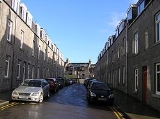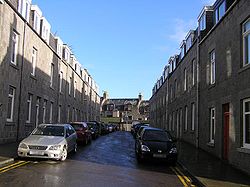
Henry John Burnett
Encyclopedia

Scotland
Scotland is a country that is part of the United Kingdom. Occupying the northern third of the island of Great Britain, it shares a border with England to the south and is bounded by the North Sea to the east, the Atlantic Ocean to the north and west, and the North Channel and Irish Sea to the...
and the first in Aberdeen
Aberdeen
Aberdeen is Scotland's third most populous city, one of Scotland's 32 local government council areas and the United Kingdom's 25th most populous city, with an official population estimate of ....
since 1891. He was tried at the high court in Aberdeen between 23 and 25 July 1963 for the murder of merchant seaman Thomas Guyan. His execution, at Craiginches Prison in Aberdeen
Aberdeen
Aberdeen is Scotland's third most populous city, one of Scotland's 32 local government council areas and the United Kingdom's 25th most populous city, with an official population estimate of ....
, was carried out by the hangman Harry Allen.
Background
On 2 February 1957, Thomas Guyan married Margaret May, and a year later they moved into a first floor flat at 14 Jackson Terrace, Aberdeen, a house owned by May's grandmother Annie Henderson.A son was born in September 1958 followed by a second in February, 1961; however, the father of this second child was not Thomas. This led to marital problems which came to a head in 1962 when Margaret consulted a solicitor about the possibility of a divorce which her husband refused. Then, in December of that same year she went to work at John R. Stephen Fish Curers where she met a new admirer, Henry Burnett.
A relationship soon developed and by May 1963, Margaret had moved out of Jackson Terrace with her younger son Keith to share a new address in Skene Terrace with Burnett.
Events of 31 May 1963
Henry Burnett came to believe that, given the chance, Margaret would leave him so he took to locking her in the house whenever he went out. This was not a state of affairs which Margaret relished so when she by chance met her estranged husband again on 31 May, she agreed to go back to him.Margaret Guyan arrived at 40 Skene Terrace at 4.00pm, to collect her son Keith. A family friend, Georgina Cattanagh, went with her for moral support. As soon as Margaret announced her intention to go back to her husband Burnett cried "Margaret, Margaret, you are not going to leave me!" He then drew a knife to Margaret's throat, closing the door behind them.
Fearful of what was happening inside, Cattanagh banged repeatedly on the front door and demanded the release of Margaret. Minutes later Burnett threw open the door and ran off down the street. Margaret was shaken but relatively unhurt. The two women made their way back to Jackson Terrace.
Burnett went to his brother Frank's workplace and told him what had happened; his brother urged him to go to the police. But Burnett, still set on revenge, instead went to Frank's house in the city's Bridge of Don area to borrow his brother's shotgun
Shotgun
A shotgun is a firearm that is usually designed to be fired from the shoulder, which uses the energy of a fixed shell to fire a number of small spherical pellets called shot, or a solid projectile called a slug...
. Although Frank's wife had been told never to lend the gun to anyone, Burnett forced the cabinet open and stole the gun along with cartridges. He then boarded a bus to 14 Jackson Terrace.
He arrived at the Guyans' flat and forced his way in. Cattanagh screamed "You can't come in here!", Thomas Guyan jumped to his feet to see what the problem was. As he opened the kitchen door he was met by Burnett, carrying the gun. A shot rang out and Guyan fell dead, having been shot in the face at close range. Burnett then took Margaret out of the flat at gun point and on the way down the stairs he threatened a young boy from a neighbouring flat.
Burnett dragged Margaret down a lane and as far as a garage on Seaforth Road, near the main route north out of Aberdeen. There John Innes Irvine was filling his car with petrol when Burnett demanded his car. Irvine tried to stop Burnett stealing the car but was threatened with the shotgun. The police were soon notified and began following the car which was driving North towards Peterhead
Peterhead
Peterhead is a town in Aberdeenshire, Scotland. It is Aberdeenshire's biggest settlement , with a population of 17,947 at the 2001 Census and estimated to have fallen to 17,330 by 2006....
. After driving for about 15 miles Burnett pulled the car over near the town of Ellon
Ellon, Aberdeenshire
Ellon is a town in Aberdeenshire, Scotland, approximately north of Aberdeen, lying on the River Ythan which has one of the few undeveloped river estuaries on the Eastern coast of Scotland. It is in the ancient region of Formartine...
, and offered no resistance as he was arrested by Constable James G. Raeper and Constable Mitchell.
Trial
At his trial, Burnett's defence was that at the time of the crime he was insane or alternatively, that this was a case of diminished responsibilityDiminished responsibility
In criminal law, diminished responsibility is a potential defense by excuse by which defendants argue that although they broke the law, they should not be held fully criminally liable for doing so, as their mental functions were "diminished" or impaired. The defense's acceptance in American...
. Both defences failed after the jury had considered the evidence for 25 minutes. The court heard about Burnett's mental state and it was revealed he had been violent in the past and had attempted suicide
Suicide
Suicide is the act of intentionally causing one's own death. Suicide is often committed out of despair or attributed to some underlying mental disorder, such as depression, bipolar disorder, schizophrenia, alcoholism, or drug abuse...
. His mother and father both appeared in the witness box and his mother broke down in the court.
After he was sentenced to death, both his own family and that of the victim petitioned for his reprieve.
There was, however, no appeal from Burnett, and on the morning of 15 August 1963 the 21-year old was executed on the UK's newest gallows (built that same year) as a crowd of 200 people gathered outside the jail.
See also
- Capital Punishment in the UKCapital punishment in the United KingdomCapital punishment in the United Kingdom was used from the creation of the state in 1707 until the practice was abolished in the 20th century. The last executions in the United Kingdom, by hanging, took place in 1964, prior to capital punishment being abolished for murder...
- Courts of ScotlandCourts of ScotlandThe civil, criminal and heraldic Courts of Scotland are responsible for the administration of justice. They are constituted and governed by Scots law....
- John Alan WestJohn Alan WestJohn Alan West was a 53-year-old laundry van driver from Seaton, Cumberland, England, murdered by two men on 7 April 1964. His murder led to the executions of Peter Allen and Gwynne Evans — the last executions in the United Kingdom.-Crime and arrest:John West, who lived alone, had returned to...
whose murder led to the last executions in the UK, in 1964.

